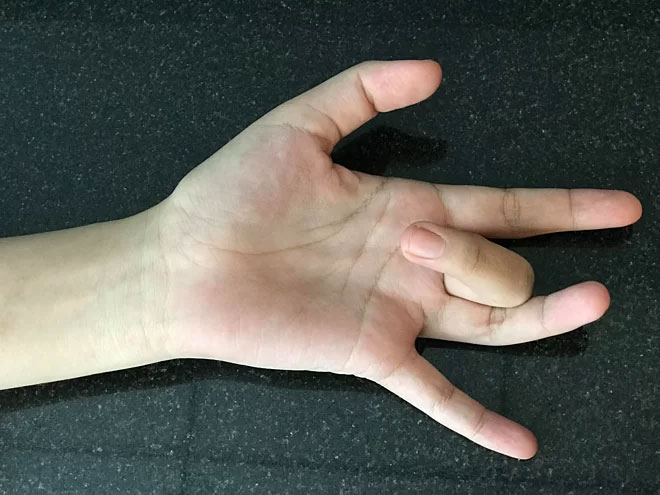Spring finger is what disease?
People with spring fingers have lumps in their palms, have difficulty folding or stretching their fingers, especially in the morning.
According to Dr. Nguyen An Phap, University Hospital of Medicine and Pharmacy in Ho Chi Minh City, spring fingers are also called pop fingers or trigger . The disease is common in women between the ages of 35 and 60. It is caused by the adhesion between the folding finger and the pulley holding the tendon, causing the folded tendon to stick to the pulley, preventing the finger from stretching.
The disease is common in professionals who have to use their fingers regularly such as teachers, office workers, tailors, typists . People with endocrine disorders such as diabetes, gout also often .
Symptoms of spring fingers usually begin without any injury or after a period of heavy work. Symptoms include soft lumps in the palm of the hand, swelling, pain when folding or straightening fingers. In severe cases, the finger cannot straighten, possibly with one or more fingers.

Symptomatic patients cannot extend their fingers after folding.(Photo: Cam Anh).
French doctor said that finger spring disease, if detected and treated early, can avoid complications, short treatment time, save costs, less affect life and work.
The treatments
Non-surgical treatment
Patients with mild conditions can take analgesic anti-inflammatory drugs and apply physical therapies such as ultrasound, wax dip, exercise, finger splint . When taking medicine and physiotherapy If the patient responds well, the patient will receive the medication.
Treatment with surgery
If the disease is severe, prolonged and does not meet the above measures, the doctor will order minor surgery.
Traditional medicine
While waiting for surgery, the acupuncture or implantation method will only help the patient relieve pain, reduce inflammation. Patients can combine with physiotherapy to treat faster.
Traditional medicine combined with non-pharmacological treatments to help patients limit the use of anti-inflammatory analgesics, resolving many symptoms.
French doctors advise patients to be carefully examined at health facilities to know the exact cause. From there, the doctor will recommend the appropriate course of treatment.
- 'Gun trigger finger' due to surfing the smartphone
- Guess the disease through the length of the finger
- 6 diseases easily break out in winter - spring
- The ring finger reveals the richness of men
- Finger shape speaks up your personality
- 3 types of fruits that are not so, prove sometimes do not believe in your eyes
- How quickly is poison in finger leaves killing people?
- Spring in the Department of Astronomy
- The reason why controlling the ring finger always makes us tired
- An odd episode in spring
- Dengue fever occurs in 38 provinces and cities
- Gastrointestinal disease is susceptible in spring
 13 causes of non-itchy rash
13 causes of non-itchy rash How the mouse with human ears changed the world?
How the mouse with human ears changed the world? The truth about 'fried rice syndrome!
The truth about 'fried rice syndrome! What is dental implant?
What is dental implant?